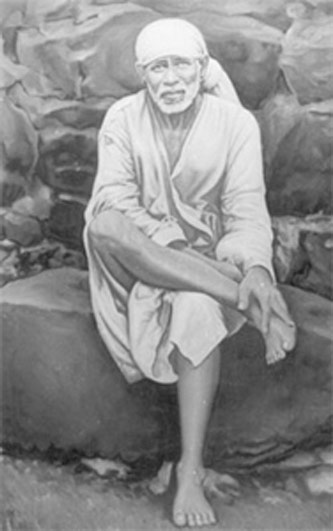 The extracts in this anthology are taken from Shri Sat Charitra. They comprise part of Chapters in which the author, Shri Govind Raghunath Dabolkar alias Hemadpant refers to Saibaba his devotees and vision.
The extracts in this anthology are taken from Shri Sat Charitra. They comprise part of Chapters in which the author, Shri Govind Raghunath Dabolkar alias Hemadpant refers to Saibaba his devotees and vision.
Shri Sai Baba
Shri Sai Baba is revered as one of the greatest saints ever seen in India, endowed with unprecedented powers, and is worshipped as a God incarnate. (SAI meaning Sakshaat Ishwar) - GOD THE ABSOLUTE
This mysterious Fakir first made his appearance in Shirdi as a youth and remained there throughout his long life. HE transformed the lives of those who met him and continuously is doing so even after his Samadhi in 1918 for those whose hearts are touched by his love and who pray and call him at any emergency in life for his blessings.
Baba stated that his mission is to “Give Blessings” without discrimination to all, and he proves it in myriad ways by healing the sick, saving lives, protecting the vulnerable, averting accidents, granting offspring, facilitating financial gain, bringing people into harmony within themselves and with each other and, above all, in effecting the spiritual evolution and transformation of those who came to him as the last resort.
Baba is, as one of his contemporary devotees put it, “The embodiment of the Supreme Spirit lighting the sadhaka's (seekers') path by His every word and action”.
To his devotees, Baba is nothing less than a GOD. This has been a matter of experience and not imaginary.
“I look at all with an equal eye”
An outstanding aspect of Sai Baba is that he is beyond distinctions of religion, caste or creed. He embodied all religions and preached the Universal religion of Love.
Devotees of all faiths find their meeting point in the Sai and people from all communities and all walks of life are united by the great love and reverence Baba inspires in them. Baba had great regard for his Hindu devotees and their Gurus and he responded to their needs and permitted worship according to the Hindu and other religious rituals. At the same time his dwelling place was a Masjid (Mosque) and the name of Allah was ever on his lips. HE described himself as in Service to GOD (ALLAH) and as a soul ever remembering ALLAH -(YAD - A - HAKKA)
People today flock Shirdi in ever-increasing numbers to pay homage to the Divine and to experience the truth of Baba’s promise that He would be active in answering devotees' prayers even from his tomb. Like Ten Commandments BABA has given eleven assurances to humanity for welfare.
Baba said that he was a slave in the service of those who loved him that he was ever living to help those who turn to him and that he has to take care of his children day and night. He then taught the values of total surrender to the Almighty Master (ALLAH MALIK EK- The only ONE) and experience his grace.
In coming to Baba’s Shirdi His children experience the truth how BABA unfailingly fulfil his commitments to his devotees by coming to their rescue in times of crisis.
Origins and First Appearance
 Nobody knew the parents, birth or birthplace of Sai Baba. Many inquiries were made, many questions were put to Baba and others regarding these details, but no convincing answer or information has yet been obtained. Practically we know nothing about these matters. When asked about his relatives and other details he gave only one answer:'From very long'.
Nobody knew the parents, birth or birthplace of Sai Baba. Many inquiries were made, many questions were put to Baba and others regarding these details, but no convincing answer or information has yet been obtained. Practically we know nothing about these matters. When asked about his relatives and other details he gave only one answer:'From very long'.
Note: These words uttered by SAI BABA have been actually heard by the daughter-in-law of Mrs Bayajamaa Kote Patil. She was a witness to the dialogue between Mrs Bayajamaa Kote Patil and BABA who came for Bhiksha at Mrs Bayaja's place.
He first manifested himself as a young lad of sixteen under a Neem tree in Shirdi for the sake of Bhaktas. Even then He seemed to be full with the knowledge of a Brahman (the only one Universal force or energy governing all matters). He had no desire for worldly objects and pleasures even in dream. He renounced Maya (delusion) and Mukti (deliverance) was at his feet. With his blessings many souls attained liberation.For all the seekers he uttered only three words- 'ALLAH ACHCHA KAREGA' by way of his blessings. Everything will be fine by the GRACE OF GOD.
One old woman of Shirdi described him as follows:
This young lad, fair, smart and very handsome was first seen under the Neem tree seated in an ‘asana’ (a Yoga posture). The people of the village were wonder-struck to see such a young lad practicing hard penance, not minding heat and cold. By day he associated with none, by night he was afraid of nobody. People were wondering and asking, when this young chap had turned up. His form and features were so beautiful that a mere look endeared Him to all. He went to nobody’s door, always sat near the neem tree. Outwardly he looked very young; but by his action he appeared to be really a Great Soul. He was the embodiment of dispassion and was an enigma to all. Nobody knew his where about and his mysterious behavior (Leelas).
It is said that one day, God Khandoba at Shirdi possessed the body of some devotee and people began to ask Him, "Deva (God), you please enquire what blessed father’s son is this lad and when did He come".
God Khandoba asked them to bring a pickaxe and dig at a particular place. When it was dug, bricks were found underneath a flat stone. When the stone was removed, a corridor led to a cellar where cow-mouth-shaped structures, wooden boards, necklaces were seen.
Khandoba said, "This lad practiced penance here for 12 years." When the people began to question the lad about this, He put them off by telling them that it was His Guru’s place, His holy ‘Watan’ (inheritance) and requested them to guard it well.
The young Baba thus stayed on in Shirdi for a period of three years. Then, all of a sudden, He disappeared. After some time, He reappeared in the Nizam State near Aurangabad and eventually again returned to Shirdi with the marriage party of one Chand Patil, when He was twenty years old.
Return to Shirdi
There lived in the Aurangabad district (Nizam State), in a village called Dhoop, a well-to-do Mohammedan gentleman by the name Chand Patil. While he was making a trip to Aurangabad, he lost his mare. For two long months, he made a diligent search but could get no trace of the lost mare. After being disappointed, he returned from Aurangabad with the saddle on his back. After travelling four Koss and a half, he came, on the way, to a mango tree under the foot of which sat a fakir (queer fellow). He had a cap on His head, wore Kafni (long robe) and had a "Satka" (short stick) under his armpit and he was preparing to smoke a Chillim (pipe). On seeing Chand Patil pass by the way, he called out to him and asked him to have a smoke and to rest a little. The Fakir asked him about the saddle. Chand Patil replied that it was of his mare, which was lost. The queer fellow or Fakir asked him to make a search in the Nala(small stream) close by. He went and the wonder of wonders! he found out the mare. He thought that this Fakir was not an ordinary man, but an Avalia (a great saint), A queer personality. He returned to the Fakir with the mare. The Chillim was ready for being smoked, but two things were wanting; (1) fire to light the pipe, and (2) water to wet the chhapi (piece of cloth through which smoke is drawn up). The Fakir took his prong and thrust it forcibly into the ground and out came a live burning coal, which He put on the pipe. Then He dashed the Satka on the ground from whence water began to ooze. The chhapi was wetted with that water, was then wrung out and wrapped round the pipe. Thus everything being complete, the Fakir smoked the Chillim and then gave it also to Chand Patil. On seeing all this, Chand Patil was wonderstruck. He requested the Fakir to come to his home and accept his hospitality. Next day he went to the Patil’s house and stayed there for some time. The Patil was a village officer of Dhoop. His wife’s brother’s son was to be married and the bride was from Shirdi. So Patil made preparations to start for Shirdi for the marriage. The Fakir also accompanied the marriage-party. The marriage went off without any hitch, the party returned to Dhoop, except the Fakir alone stayed in Shirdi and remained there forever.
How the Fakir got the name ‘Sai’
When the marriage - party came to Shirdi, it alighted at the foot of a Banyan tree in Bhagata Mhalsapati’s field near Khandoba’s temple. The carts were loosened in the open courtyard of Khandoba’s temple and the members of the party descended one by one, and the Fakir also got down. Bhagat Mhalsapati saw the young Fakir getting down and spontaneously accosted Him "YA SAI" (Welcome Sai). Others also addressed Him as Sai and thenceforth he became known as Sai Baba.
Upon his return to Shirdi, Baba stayed there for an unbroken period of sixty years, after which He took His Maha-Samadhi in the year 1918.
Initially, Sai Baba stayed on the outskirts of the village of Shirdi, then under a neem tree for four to five years at the spot now called Gurusthan, before shifting to an abandoned mosque which later became known as Dwarkamai.
Slowly his greatness was revealed and his fame spread far and wide, until by the end of his life he was attracting thousands of people to Shirdi. In the last decade of his life, Baba was worshipped with all pomp and ceremony and the mosque was likened to a maharajah’s ‘darbar’, yet Baba never changed His simple and austere lifestyle of the Puritans.
Sai Baba’s Mission and Advice
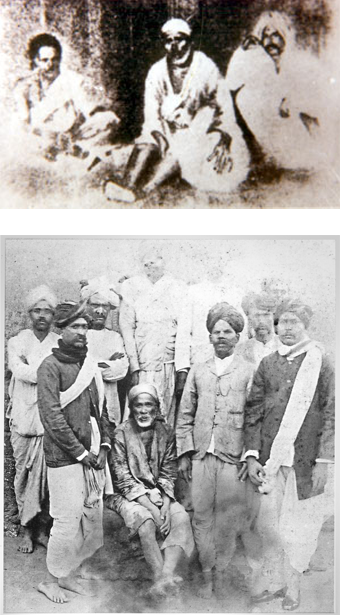 Saint Ramadas (1608-1681) flourished in the 17th century and fulfilled to a great extent his mission of protecting the helpless cows and Brahmins against the Yavanas powerful (Mohammedans or Followers of Islam), but within two centuries after him, the split between the two communities -- Hindus and Mohammedans widened again, and it is believed that Sai Baba came to bridge the gulf.
Saint Ramadas (1608-1681) flourished in the 17th century and fulfilled to a great extent his mission of protecting the helpless cows and Brahmins against the Yavanas powerful (Mohammedans or Followers of Islam), but within two centuries after him, the split between the two communities -- Hindus and Mohammedans widened again, and it is believed that Sai Baba came to bridge the gulf.
His constant advice to all was to this effect. God is the only One Almighty Master of all souls and never discriminates while showering his Love on the souls who are all equals before him. He loves every soul irrespective of his/her vices or virtues. "Rama (the God of the Hindus) and Rahim (the God of the Mohammedans) are one and the same; there is not the slightest difference between them; then why should their devotees quarrel among themselves? You ignorant folk, children, join hands and bring both the communities together, act sanely and thus you will gain your object of national unity. It is not good to dispute and argue. So don't argue, don't emulate others. Always consider your interest and welfare. The Lord will protect you. Yoga, sacrifice penance, and knowledge are the paths (means) to attain God. If you do not succeed in this by any means, invain is your birth. If any one does any evil unto you, do not retaliate. If you can do anything, do some good unto other." Baba shall always support any truthful thought or action.
This, in short, was Sai Baba's advice to all; and this will stand in good stead both in material and spiritual matters. Baba assured, without any discrimination, all the seekers (MUMUKSHUS) His divine and unfailing support for material welfare and spiritual elevation. There is no soul in the world who has not experienced Baba's instant support and protection in moment of crisis.
Sai Baba as Satguru
There are many so-called Gurus, (imposters) who go about from house to house with cymbals and veena in their hands, and make a show of their spirituality. They blow mantras into the ears of their disciples and extract money from them. They profess to teach piety and religion to their disciples, but are themselves impious and irreligious. Sai Baba never thought of making the least show of his worth (piety). Body-consciousness, he had none, but he had great love for the disciples. There are two kinds of Gurus:
(1) 'Niyat' (appointed or fixed) and (2) 'Aniyat' (unappointed or general). The latter by their advice develop the good qualities in us, purify our hearts and set us on the path of salvation; but contact with the former, dispels our duality (sense of difference); and establishes us in Unity by making us realize "Thou art that" there are various Gurus imparting various kinds of wordy knowledge, but he, who fixes us in our Nature (Self) and carries us beyond the ocean of wordy existence, is the Satguru. Sai Baba was such a Satguru. He always said, 'Words create delusion (MAYA BHRAMA) But Company of Sat Guru (SATSANG) imparts knowledge by removing ignorance. His greatness is undescribable. If anybody went to take His darshana, he, without being asked, would give every detail of his past, present and future life. He saw Divinity in all beings. Friends and foes, the virtuous and the vicious were alike to Him. Disinterested and equal-balanced, He obliged also the evildoers. He was the same in prosperity and adversity. No doubt, ever touched Him. Though He possessed the human body, He was not in the least attached to his body or house. Though he looked embodied, he was really disembodied, i.e., free in this every life (MUKTATMA).
Wonderful Incarnation
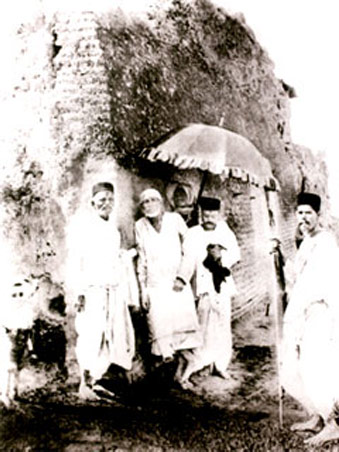 Sai Baba as a Yogi- Satchidanand SATGURU
Sai Baba as a Yogi- Satchidanand SATGURU
Sai Baba knew all yogic practices. He was well versed in the six processes, including Dhauti, Khandayoga and Samadhi, etc. He demonstrated His mastery over yogic exercises many a times.
Yet, if you think that he was a Hindu, He looked like a Yavan. If you think Him to be a Yavan, he looked like a pious Hindu. Definitely no one knew whether he was a Hindu or a Mohammedan. Inferences could be drawn from His dress or body features, but all such superficial inferences were meaningless. They did not serve any purpose.
He celebrated the Hindu festival of Rama-Navami with all due formalities and at the same time permitted the ‘Sandal’ procession of the Mohammedans. He encouraged wrestling bouts in this festival and gave good prizes to winners. When the Gokul Ashtami came, he got the ‘Gopal-Kala’ ceremony duly performed and on Id festivals, he allowed Mohammedans to say their prayers (Namaj) in his masjid.
Once at the Moharum festival, some Mohammedans proposed to construct a Tajiya or Tabut in the Masjid, keep it there for some days and afterwards take it in the procession through the village. Sai Baba allowed the keeping of the Tabut for four days and on the fifth day removed it out of the Masjid without the least compunction. He allowed all the devotees to celebrate festivals at Shirdi according to their preferences and the various religious in vogue adopted by them. In Baba's Masjid except a garlanded wall there is no image or photograph of any deity.
If we say that he was a Mohammedan, his ears were pierced (i.e. had holes according to Hindu fashion). If you think that he was a Hindu, he advocated the practice of circumcision (though according to Mr Nanasaheb Chandorkar, who observed him closely, he was not himself circumcised. Wide article in Sai Leela on "Baba Hindu Ki Yavan" by B.V. Deo, page 562). If you call him a Hindu, he always lived in the Masjid; If Mohammedan, he had always the Dhuni - sacred fire there, and the following things which are contrary to Mohammedan religion, i.e., grinding on the hand mill, blowing of the conch and bells, oblation in the fire, Bhajan, giving of food, and worship of Baba’s Feet by means of ARDHYA (water) were always allowed there. If you think that he was a Mohammedan, the best of Brahmins and Agnihotris, leaving aside their orthodox ways, fell prostrate at his feet. Those who went to make inquiries about his nationality were dumbfounded and were captured by his Darshana. He gave visions of all the respective Gurus and deities according to devotees choice whether expressed or hidden. Baba, when asked about his creed, to that he belonged to a Saint Kabir's creed.
So none could definitely decide whether Sai Baba was a Hindu or a Mohammedan. This is no wonder; for he who completely surrenders himself to the Lord, by getting rid of his egoism and body - consciousness thus becomes one with him, and has nothing to do with any questions of caste or nationality. Such a one as Sai Baba was, saw no difference between caste and among beings and beings. He took meat and fish with Fakirs, but did not grumble when dogs touched the dishes with their mouths. Thus Sai Maharaj was beyond all personal references, time and space dimensions.
Such a unique and wonderful GOD incarnation was Sai Baba.
[* Note--(1) Mhalsapati, an intimate Shirdi devotee of Baba, who always slept with Him in the Masjid and Chavadi, said that Sai Baba told him that he was a Brahmin of Pathari and was handed over to a Fakir in his infancy, and when He told this, some men from Pathari had come, and Baba was inquiring about some men from that place. [Video Sai Leela 1924, Page 179. (2) Mrs. Kashibai Kanitkar, the famous learned woman of Poona says of the experience No.8, published on Page 79, Sai Leela Vol. 11,1934, - "On hearing of Baba’s miracles, we were discussing according to our theosophical convention and fashion whether Sai Baba belonged to black or white lodge. When once I went to Shirdi, I was thinking seriously about this in my mind. As soon as I approached the steps of the Masjid, Baba came to the front and pointing to His chest and staring at me spoke rather vehemently -"This is a Brahmin, pure Brahmin. He has nothing to do with black things. No Musalman can dare to step in here. He dare not." Again pointing to his chest - "This Brahmin can bring lacks of men on the white path and take them to their destination. This is a Brahmin’s Masjid and I won’t allow any black Mohammedan to cast his shadow here."]
Sai Baba is widely regarded as an incarnation of God, but he always said that he was an obedient servant of God. Though an incarnation he showed the people the way how to behave satisfactorily and carry out the duties of their respective stations (Varnas) in this life. He never emulated others in any way, nor asked others to have something done for him. For him, Who saw the Lord in all movable and immovable things of this world, humility was the most proper thing. None he disregarded or disrespected; for he saw Narayan (Lord) in all beings, he never said, "I am God," but that he was a humble servant and he always remembered him and always uttered - "Allah Malik" (God is the sole proprietor or Owner). By his thoughts and worldly behavior He established ideal values and virtues of faith, patience and humanity. One should concentrate on and do faithfully one's duties assigned to him/her by GOD and wait patiently for the results (fruits) of his action (Karma) because the effect of any cause is always determined by GOD.
Greatness of Udi (ITS MIRACULOUS POWERS)
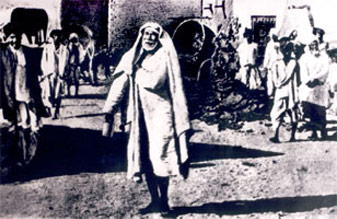 It is well-known that Baba took Dakshina from all, and out of the amount thus collected, He spent a lot on charity and purchased fuel with the balance left with Him. This fuel He threw in the Dhuni - the sacred fire, which he kept ever burning. The ash from this fire was called Udi and it was freely distributed to the devotees at the time of their departure from Shirdi. Udi or ash is the purest substance on earth having tremendous powers of doing and undoing and is the result of sacrifices offered to fire (agni) which purifies everything by destroying whatever is evil. Performing 'Yagha' (Dhuni) is the most pious ritual recommended in the ancient Vedic literature.
It is well-known that Baba took Dakshina from all, and out of the amount thus collected, He spent a lot on charity and purchased fuel with the balance left with Him. This fuel He threw in the Dhuni - the sacred fire, which he kept ever burning. The ash from this fire was called Udi and it was freely distributed to the devotees at the time of their departure from Shirdi. Udi or ash is the purest substance on earth having tremendous powers of doing and undoing and is the result of sacrifices offered to fire (agni) which purifies everything by destroying whatever is evil. Performing 'Yagha' (Dhuni) is the most pious ritual recommended in the ancient Vedic literature.
There is a deeper underlying significance behind Baba’s practice of distributing Udi. Baba taught by his udi that all the visible phenomena in the universe are as transient as the ash. Our bodies composed of wood or matter of the five elements will fall down, become inanimate after all their enjoyments are over, and will be reduced to ashes. In order to remind the devotees of the fact that their bodies will be reduced to ashes, Baba distributed Udi to them. Baba also taught by the Udi that the Brahma is the only reality and the universe is ephemeral and that no one in this world, be he a son, father or wife, is really ours. We come here (in this world) alone and we have to go out alone. It was found and is even now found out, that the Udi cured many physical and mental maladies, but Baba wanted to din into the devotee's ears the principles of discrimination between the Unreal and the Real, non-attachment for the unreal, by His Udi and Dakshina. The former (Udi) taught us discrimination and the latter (Dakshina) taught us non-attachment. Unless we have these two things, it is not possible for us to cross over the sea of the mundane existence. So Baba asked for and took Dakshina, and while the devotees took leave, He gave Udi as Prasad, besmeared some of it on the Bhaktas' foreheads and placed his boon-conferring hand on their heads. When Baba was in a cheerful mood, he used to sing merrily. One such song was about Udi. The text of the Udi song was, "Oh, playful Rama, come, come, and bring with you sacks of Udi." Baba used to sing in very clear and sweet tones.
So much about the spiritual implication of Udi. It had also its material significance. It conferred health, prosperity, freedom from anxiety, and many other worldly gains. So the Udi has helped us to gain both our ends - material as well as spiritual.
SaiBaba's Nature and Personality
 It is on account of Sai Baba that Shirdi grew into importance. It is interesting to study what sort of a personage Sai Baba was.
It is on account of Sai Baba that Shirdi grew into importance. It is interesting to study what sort of a personage Sai Baba was.
Sai Baba conquered this Samsar (worldly existence), which is like a deep sea, very difficult and hard to cross. Peace or mental calm was his ornament and he was the repository of wisdom. He was the home of Vaishnava devotees, most liberal (like Karna) amongst liberals, the quintessence of all essences. He had no love for perishable things and was always engrossed in self-realization, which was his sole concern. He felt no pleasure in the mundane things of this world or of the world beyond. His Antarang (heart) was as clear as a mirror and his speech always rained nectar. The rich or poor people were the same to Him. He did not know or care for honor or dishonor.`
Baba was the Lord of all beings. He spoke freely and mixed with all people, saw the acting and dances of ‘Nautchgirls’ and heard Gazhal songs. Still, he swerved not an inch from Samadhi (mental equilibrium). The name of Allah was always on his lips. While the world awoke, he slept; and while the world slept, he was vigilant. His abdomen (Inside) was as calm as the deep sea. His Ashram (life-stage) could not be determined, nor his actions could be definitely determined and though he sat (lived) in one place, he knew all the transactions of the world. His darbar was imposing. He told daily hundreds of stories; still he swerved not an inch from his vow of silence. He always leaned against the wall in the Masjid or walked morning, noon and evening towards Lendi (Nala) and Chavadi; still he at all times abided in the Self. Though a Siddha, he acted like a Sadhaka. He was meek, humble and egoless, and pleased all. Such was Sai Baba, and as the soil of Shirdi was trodden by Sai Baba’s feet, it attained extraordinary importance.
By day he always sat under the neem tree, sometimes under the shade of a branch of a babul tree near the stream at the outskirts of the village.
Many Sanyasis, Sadhakas and all sorts of men aspiring for salvation came to Sai Baba. He always walked, talked and laughed with them and always uttered with His tongue ‘Allah Malik’ (God is the sole owner). He never liked or encouraged discussion or arguments. He was always calm and controlled, though irritable at times, always preached full Vedanta and nobody knew till the last the real Baba.
Dress Demeanor and Daily Routine
His demeanor was quiet and sober. However on occasions he used to get ruffled because of some suggestion of calamity or evil in his devotees life. He did not talk frequently and was in trance. His eyes penetrating skies. Since his young days, Sai Baba grew hair on His head, never had His head shaved. He used to wear a piece of white cloth round His head along with a long flowing Kafni. The piece of white cloth on the head was twisted like matted hair and flowed down from the left ear on the back. This was not washed for weeks. He wore no shoes, no sandals. A piece of sackcloth was his seat for most of the day. He wore a coupin (waist-cloth-band) and for warding off cold he always sat in front of a Dhuni (sacred fire) facing South with his left hand resting on the wooden railing. While sleeping in the Chavadi Baba used to rest his head on a brick.
Sai Baba visited certain houses daily and went from door to door where he stood as a beggar and called out, "Oh Mai, give me a piece of bread" and spread out his hand to receive the same. In one hand he carried a Tumrel (tinpot) and in the other a Zoli or choupadari, i.e., a rectangular piece of cloth as food collecting bag. Liquid or semi-liquid things such as soup, vegetables, milk or buttermilk were received in the tinpot, while cooked rice, bread, and such solid things were taken in the Zoli. Baba's tongue knew no taste as he had acquired control over it. Whatever things he got in his Zoli and in the tinpot were mixed together and partaken by Baba to his heart's content. The food collected was poured into Kolamba - a stone pot and animals and birds used to cluster around the pot to eat food. Baba never prevented them from eating.
Baba begged till noon, but his begging was very irregular. Some days he went a few rounds, on other days up to twelve noon.
In the afternoon, he used to walk at random and go at times to neighboring villages to the houses of some of his devotees.
Style of Teaching
As for Sai Baba’s style of teaching, he did not deliver lectures and rarely gave formal teachings. He has never written anything by way of wordy philosophy. Rather, he taught orally by parable, direct experience and the example of his own life. He assures all that each could experience. His Devine Love and blessings flew directly and not through any intermediary. All would experience fulfillment of their worldly desires and also perfect satisfaction of their craving for self realization (AATMA BODHA). There is no exception to this experience.
Baba’s way is to cater directly to the needs of each individual and he did not require His devotees to take up any rituals or conventionally prescribed practice, nor did he favoured any particular path over another. Baba generally discouraged people from changing their chosen form of worship in GOD and never advised total detachment from worldly life and changeover of preference for a particular deity as GOD. He advised perfect loyalty in and faith in the power and blessings of the Almighty (ALLAH MALIK) and patience for the results of action (KARMA). As a result of Baba's grace, devotees experience self-generated conviction and faith that whatever their desires and aspirations are, they will never go unnoticed by Baba and they would not return empty-handed from SAI-COURT (DARBAR).
Baba’s Personal Belongings (Articles used by Baba)
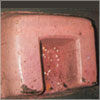
Chulli
Used by Baba for preparing food (Prasad) and later distributing to gathering of devotees (Annadan).
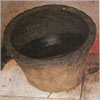
Kolamba
A stone pot which Baba used to place collected (Bhiksha). The food placed at an open place near Masjid was eaten by insects, birds and animals like dogs, cats, pigs. The remainder used to be eaten by Baba.
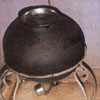
Water-Pot
Used for storing water to be drunk by all the thirsty (Pan-Pot)
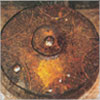
Jata
Jata (Hand mill) a pair of stone crushers used for grinding wheat implying that the seed of Karma when crushed and transformed into floor destroys the consequences of all good and evil deeds and liberates soul from binding of Karma.
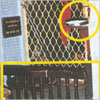
Udi Stand and Kathada (Railing)
At Masjid where Baba used to place his hands and attended visitor artists and give them Prasad (fruits or coins and handful of udi- as the most precious, pure and powerful substance in the universe from all sorts of contamination by evil or malignancy).
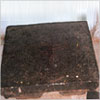
Baba’s Bathing Stone
On this stone Baba used to take bath which was executed by devotees.
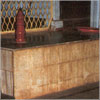
Udi Stone and Ota (Platform)
For burning essence sticks or udi (Loban) sticks whose fragrance was pleasant For creating a purified scented atmosphere. Baba used to sit on the platform on which udi stand was fixed.
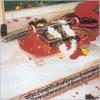
Satka (Stick)
The thick stick used by Baba to drive away evil for protecting his devotees facing calamities.
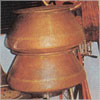
Two Copper Pots
Used by Baba to cook Khichadi or sweet Pulav as his Prasad (Annadan)



